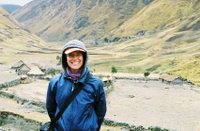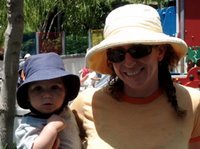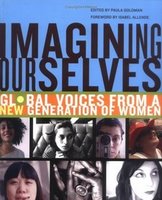It is a big, beautiful magazine printed on thick paper with lots of photos and illustrations. It feels like a print version of Current TV (Al Gore is an Associate Publisher) with short, visual articles like Peter Allsop's review of the movie Our Daily Bread, Zach Frechette's description of the NYChildren photo series, and portraits of Dan Barber (creative director of the Stone Barnes Center for Food and Agriculture), Peter Diamandis (founder of the X Prize Foundation), Marjora Carter (founder and executive director of Sustainable South Bronx), Chris Simcox (executive director of Minuteman Civil Defense Corps), Matt and Jessica Flannery (founders of Kiva), Jimmy Wales (founder of Wikipedia) and Amanda Congdon (former vlogger for Rocketboom).
One of my favorite articles was "The American Family Grows Up" by Neil Pollack which describes how, "middle-class American families are being forced to live, almost entirely, without a net", which he exemplifies with a story about his son putting a rock up his nose. The family's Blue Cross insurance has a "surgery deductible" and, "according to Blue Cross, sticking a tube up a child's nose to extract a rock is 'surgery.'" They had to pay $600 to have it removed.
The photos from the Border Film Project taken by migrants and minutemen were pretty cool, I appreciated the 8-page visual guide to the midterm elections, and the No Senator Left Behind chart comparing US Senators' educational background and salary with the average person's educational background was fascinating.
Overall, I enjoyed the magazine and turned down lots of page corners of things I wanted to remember, or go back to later. My only concerns with the mag are that 1. only about 25% of the articles were written by women, and 2. It has a very young feel to it. I am 37 and I felt like an "old" reader. I hope that folks older than me will want to read it, too.
I sent in my subscription. It's $20 and 100% goes to the charity of your choice: Ashoka, City Year, Creative Commons, Donors Choose, GenerationEngage, Millennium Promise, Oceana, Room to Read, Teach for America, WITNESS, World Wildlife Fund or UNICEF. I chose UNICEF.
Photo from GOOD Magazine Flickr Stream.
Good Magazine
magazine








